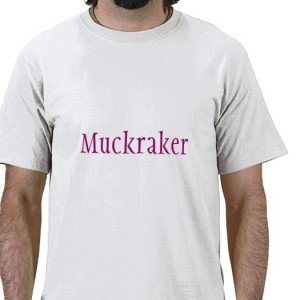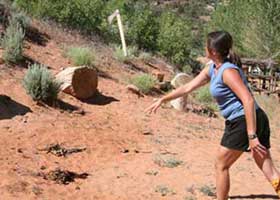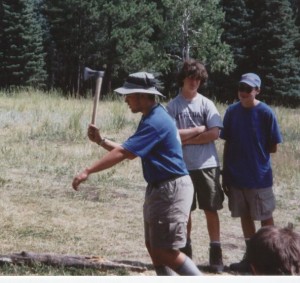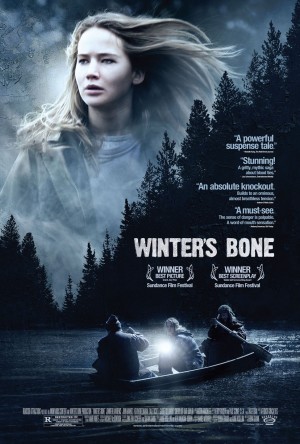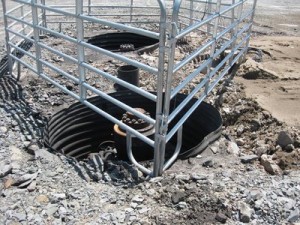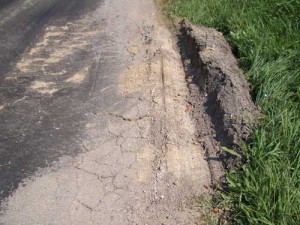My kid transferred through every school on our side of the mountain. Only six, but a fighter. I didn’t teach him that. The principals ask, – “well, Mr. Doppler, where might Fred have learned to lash out?” Nature, I say. Too much violence on this mountain – electrical storms and rockslides and predation, balled insects wriggling in spider’s silk.
Caroline heard of a different school in Bonham, some charity deal. My kid didn’t need anyone’s charity. But the authorities said they would arrest Fred next time he fisticuffed on school property. They would put him in juvenile. They’d relish that record-breaking youngest arrest in all of Tennessee.
Caroline pried open the teakettle and palmed the wad of bills. It’d shrunken. We vowed not to argue. Bad example for Fred. So we packed all we had into the truck and lumbered up the hump on the one road that crossed that mountain, a steep and pitted trace no longer maintained by the state. We ripped through bramble and green switches, shedding useless heirlooms. From the dizzying ridgeline, gravity showed us to Bonham.
Still whiplashed, we settled into life on the wrong side. Our neighbor walked a big cat – maybe a panther – on a leash. It was a dog’s leash and we saw it strain into the cougar or panther’s pulsing neck. This guy ran a small zoo in the woods behind his property and he looked mean, and we knew his kind of operation: cramped wire cages, no concern for the natural habitats. But he was friendly, too, mean-looking and friendly. Fred wanted to pet the panther so we waved and the zookeeper waved back, hand trailing smoke into the blue, and Fred put his hand out too, trusting both stranger and beast.
One morning Fred came home early from school, a note pinned to his shirt so he wouldn’t lose it. We knew this. The note would list what it didn’t mean when your kid got infested with lice. It didn’t mean: a) your kid was (necessarily) dirty, b) you were (necessarily) bad parents. The note soothed: all who live around the mountain, it said — rich or poor, owner or laborer – could suffer the peculiar biogeography of the region, its summers perfect for invasive forms of life.
I had ticks in my bed that summer, and ivies creeping through the slits feral cats clawed in the screen. The note on Fred’s shirt also requested a meeting at the school. This was unusual, but the Bonham way I guess. In the meantime, we distracted Fred from the itching. We asked him about school.
“We had to write our life story,” Fred said.
“What life story?” Caroline said, “He can barely write and he’s been asleep for nearly half of it.”
“His is a story of dreams,” I said.
“And then we had to write about our heritage,” Fred said, “but I didn’t know what to write so I drew the sun.”
Caroline and I agreed that we should tell Fred the truth about his heritage. How a strange parasite once divided the peoples of the mountain. How the patriarchs of those days quarantined the sick hosts on one side, kept the healthy half on the other, and designated the summit a sort of peace wall where the two camps could dump their trash, each inching the heap toward the downward camber of the other’s side. There were episodes of cross-mountain raiding, looting, and intimidation, we told Fred, our eyes widening as we made raiding and pillaging gestures with our arms. We delighted in embellishing the story, but I no longer knew how much of it I believed, and I realized that I could no longer discern my father’s embellishments from the rudiments of the older story.
I only knew my embellishments with any certainty. I told Fred that since we were dealing with history, he needed to know that the story might split and braid into stories. Inevitably someone would lie to him. This was when Caroline rolled her eyes, but I was getting excited now. There were conspiracy theories, I told Fred, which were accepted in certain circles on both sides of the mountain. One of them involved my employer, I told Fred, and I’d have to relate it in a whisper for fear of spies. I asked if this excited Fred. This excited Fred terribly.
The theory speculated that the balloon factory in the valley kept its own historian on staff, and that this bored man invented the parasite – going so far as to forge research abstracts, microbiological data, and an illustration of the magnified worm.
Speaking in my normal voice again, I told Fred that these theories were largely discredited, because the balloon factory has done so much for the communities on both sides of the mountain.
I’d told Fred someone would lie to him, and now it was true. It’s hell, toiling to manufacture the symbols of someone else’s party. For a pittance, too.
“Which side were we – did we have worms?” Fred asked.
“No one can agree about that, son, and our ancestors left no written history. They were too busy surviving.” I pumped my fist to emphasize this point. “Surviving,” I repeated, “that’s our heritage, Fred.”
I met with the principal. He was some kind of monk. “You don’t want us to kill the lice?” I said.
“This is a Jain school,” the monk said. “We believe that every living being has a soul. We also think it would be a good lesson in patience if you used our alternative method. For your son, I mean. Compassionate removal is painstaking but ultimately quite freeing, Mr. Doppler.”
“Thank you,” I said, “for that.”
I couldn’t complain much. The Jainism seemed to calm Fred. Night, and the frogs in the gutters throbbed close against the rent house, their song pinching deep into the metal. None of the beasts of the wood could tell we’d moved in yet. .
Fred asked why he had lice. I had to think of something. “It is the waters we swim,” I said, “the mountain whose shadow we live in. Mt. Parasite, after all.”
We still weren’t connected to the grid, so we lit the storm candles and cracked the windows. Caroline sat Fred in her lap and starting drawing the dead dog’s flea comb through his hair, drowning each louse in a glass of water with a blot of shimmering soap in it. Caroline was painstaking, her tongue peeping out in concentration, her pupils sharp in the dark. “You’re not supposed to kill the lice,” I said. She looked beautiful killing the lice. She shrugged her bare shoulders and the zookeeper passed before the open window, pretending not to spy on our infestation.
The parasitic is especially taboo here – to call someone worm is the slur of the century. We all know that soon the balloon factory will outsource and float across the sea, and we’ll be left with nothing but this old rock of gneiss. It changes too, but slowly. We’ll have a little money from the government. We’ll have our cool mountain midsummer nights.
We have to live together and all that jive, even in mountain ranges whose histories are defined by isolationism, retreat– I try to teach my kid that, as is apparently required of me. But already he senses the subtle vocal timbre of doubt in every platitude we hand him.
“I never see anyone go back there – do you think it’s really a zoo?” I asked Caroline, as she picked the nits from Fred’s scalp.
“No,” she said.
“Me neither,” I said. “Wonder what he’s hiding.”
As the zookeeper moved farther from the window, we could see him riding his big cat like a horse up the mountainside.
 Jack Boettcher is the author of the chapbook The Deviants (Greying Ghost Press, 2009), and recent work appears or is forthcoming in Fence, Gulf Coast, Pleiades, Puerto del Sol, and other journals. He lives in Austin.
Jack Boettcher is the author of the chapbook The Deviants (Greying Ghost Press, 2009), and recent work appears or is forthcoming in Fence, Gulf Coast, Pleiades, Puerto del Sol, and other journals. He lives in Austin.


